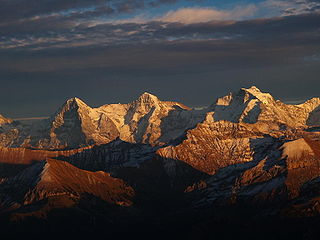
The Bernese Alps are a mountain range of the Alps, located in western Switzerland. Although the name suggests that they are located in the Berner Oberland region of the canton of Bern, portions of the Bernese Alps are in the adjacent cantons of Valais, Fribourg and Vaud, the latter being usually named Fribourg Alps and Vaud Alps respectively. The highest mountain in the range, the Finsteraarhorn, is also the highest point in the canton of Bern.

The Jungfrau Railway is a mountain railway in the Bernese Alps, connecting Kleine Scheidegg in the Bernese Oberland to the Jungfraujoch, across the Valais border. The railway, which uses a 1,000 mmmetre gauge and racks, runs 9 kilometres (5.6 mi) from the station of Kleine Scheidegg to the Jungfraujoch. It is the highest railway in Switzerland and Europe, the Jungfraujoch being the highest railway station on the continent and well above the perennial snow line. As a consequence, the railway runs essentially within the Jungfrau Tunnel, built into the neighbouring Eiger and Mönch, to protect the line from snow and extreme weather. Another particularity of the Jungfrau Railway is the high elevation of its starting point, at the hub of Kleine Scheidegg, also the highest in Europe.

The Jungfrau, at 4,158 meters (13,642 ft) is one of the main summits of the Bernese Alps, located between the northern canton of Bern and the southern canton of Valais, halfway between Interlaken and Fiesch. Together with the Eiger and Mönch, the Jungfrau forms a massive wall of mountains overlooking the Bernese Oberland and the Swiss Plateau, one of the most distinctive sights of the Swiss Alps.
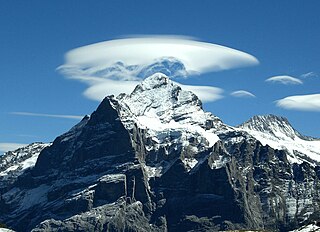
The Wetterhorn is a peak in the Swiss Alps towering above the village of Grindelwald. Formerly known as Hasle Jungfrau, it is one of three summits on a mountain named the "Wetterhörner", the highest of which is the Mittelhorn and the lowest and most distant the Rosenhorn. The latter peaks are mostly hidden from view from Grindelwald.

Grindelwald is a village and municipality in the Interlaken-Oberhasli administrative district in the canton of Berne. In addition to the village of Grindelwald, the municipality also includes the settlements of Alpiglen, Burglauenen, Grund, Itramen, Mühlebach, Schwendi, Tschingelberg and Wargistal.

The Bernese Oberland is the highest and southernmost part of the canton of Bern, and one of the canton's five administrative regions. It constitutes the Alpine region of the canton and the northern side of the Bernese Alps, including many of its highest peaks, among which the Finsteraarhorn, the highest in both range and canton.

The Grosse Scheidegg is a mountain pass in the Bernese Alps of Switzerland, The pass crosses the col between the Schwarzhorn and the Wetterhorn mountains at an elevation of 1,962 m (6,437 ft).
Grindelwald may refer to:
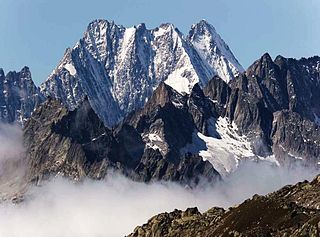
The Lauteraarhorn is a peak of the Bernese Alps, located in the canton of Bern. Together with the higher Schreckhorn, to which it is connected by a high ridge, it lies between the valleys of the Lower Grindelwald Glacier and the Unteraar Glacier, about 10 kilometres southeast of Grindelwald, the closest locality. The Lauteraarhorn belongs to the Aaremassif and is surrounded by large glaciers: the Lauteraargletscher and the Strahlegg-Gletscher and the Obers Ischmeer. Being off the main ridge of the Bernese Alps, all the glaciers surrounding the Lauteraarhorn and the Schreckhorn are part of the Aare basin. The Lauteraarhorn is the second highest summit lying wholly within the canton of Bern. Administratively, it is split between the municipalities of Grindelwald and Guttannen.

The Schynige Platte is a small mountain ridge and a viewpoint in the Bernese Highlands and belongs to the Schwarzhorn group. The mountain range consists of three peaks: Gumihorn, Tuba, and the closest summit next to the viewpoint, Geiss. The viewpoint lies at an altitude of about 2,000 metres (7,000 ft), at the western end of a prominent ridge of the Schwarzhorn group, which separates the valley of the Schwarze Lütschine from Lake Brienz.
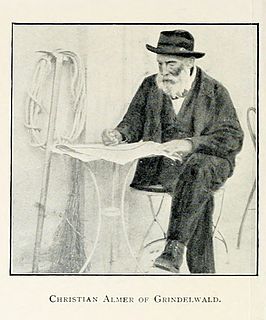
Christian Almer was a Swiss mountain guide and the first ascentionist of many prominent mountains in the western Alps during the golden and silver ages of alpinism. Almer was born and died in Grindelwald, Canton of Bern.
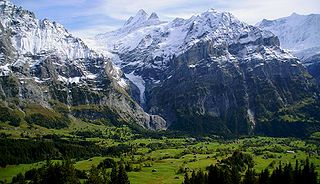
The Upper Grindelwald Glacier is one of the two valley glaciers near Grindelwald on the northern side of the Bernese Alps, in the Canton of Berne. It had a length of about 6.6 km (4.1 mi) and covered an area of 9.6 km2 (3.7 sq mi) in 1973.

The Bärglistock is a mountain of the Bernese Alps, located east of Grindelwald in the Bernese Oberland. The mountain is the tripoint between the valleys of the Upper Grindelwald Glacier, the Unteraar Glacier and the Gauli Glacier.

The Mettenberg is a mountain of the Bernese Alps, overlooking Grindelwald in the Bernese Oberland. It lies north of the Schreckhorn and forms a huge buttress of the Schreckhorn range.

The Mittelhorn is a peak in the Swiss Alps close to the village of Grindelwald. It is the highest of the three composing the Wetterhorner massif.
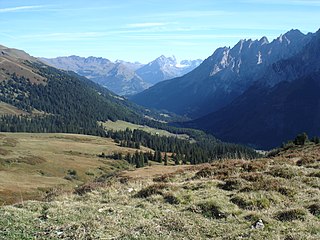
Reichenbachtal is an Alpine valley in Oberhasli, canton of Berne, Switzerland. It is situated within the municipality of Schattenhalb, connecting Meiringen with the Grosse Scheidegg pass towards Grindelwald. Its water, the Rychenbach, forms the Reichenbach Fall before joining the Aare at Meiringen.
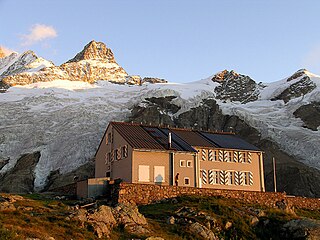
The Gleckstein Hut is a mountain hut of the Swiss Alpine Club, located east of Grindelwald in the canton of Bern. The hut lies at a height of 2,317 metres above sea level, above the Upper Grindelwald Glacier, at the foot of the Wetterhorn in the Bernese Alps.
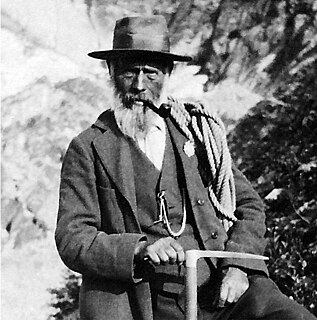
Peter Kaufmann was a Swiss mountain guide during the Silver Age of Alpinism (1865-1882) and the early twentieth century, who guided amateurs, experienced climbers, and several notables across glaciers, over mountain passes, and to the summits in the Swiss Alps, the Canadian Rockies, and the Selkirks.

Peter Bohren was a Swiss mountain guide from Grindelwald.

The Wetterhorn Elevator was an aerial tramway in the valley of Grindelwald. It connected the base of the Upper Grindelwald Glacier to a higher location in the Wetterhorn massif. The tramway was inaugurated in 1908, making it the first of its kind in Switzerland. It closed only a few years later in 1915.




















